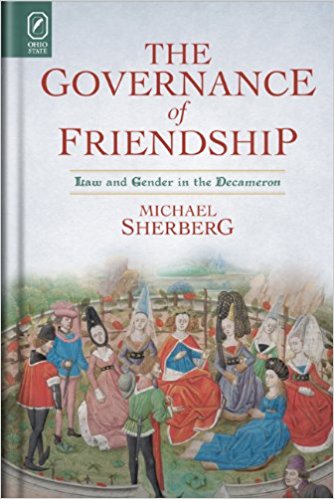https://rll.wustl.edu/xml/faculty_staff/11737/rss.xml
Professor Sherberg’s areas of interest include Italian literature of the Middle Ages and Renaissance, as well as Italian prose after the Unification, particularly children’s literature.
He has published articles on Boccaccio, Boiardo, Tasso, and Machiavelli, the canti carnascialeschi tradition in Florence, and the Italian questione della lingua. He is the author of Rinaldo: Character and Intertext in Ariosto and Tasso (Anma Libri, 1993) and The Governance of Friendship: Law and Gender in the Decameron, which The Ohio State University Press published in 2011. He published an edition of Tasso’s Rinaldo with Longo Editore in 1990, and the volume Approaches to Teaching Collodi’s Pinocchio and Its Adaptations for the MLA’s Approaches to Teaching World Literature series in 2006. During the 2006-2007 academic year he was a senior fellow with the National Endowment for the Humanities.
Recently he edited (with Victoria Kirkham and Janet Smarr) Boccaccio: A Guide to the Complete Works, (University of Chicago Press, 2013). He is also completing a translation of Jacopo Passavanti’s Specchio della vera penitenza for the Da Ponte Library series published by the University of Toronto Press, and he has begun work on a book manuscript titled Per efficacissima signa: Ethical Readership from Dante to Ariosto.

The Decameron Fourth Day in Perspective
Edited By Michael Sherberg
Professor Michael Sherberg edited The Decameron fourth day in perspective with The University of Toronto Press. This volume, part of the Lectura Boccacccii series organized by the American Boccaccio Association, offers close readings by top scholars of Day Four of the Decameron. As fans of the Decameron know, the Fourth Day opens with an important intervention in which the author defends his project against his critics, which coincides with a significant change in tone as the subject matter turns to stories with unhappy endings. The contributors approach the stories from a variety of perspectives, including the linguistic, philosophical, anthropological, and literary historical. These fresh readings of stories that are nearly seven hundred years old testify to the enduring power of Boccaccio’s masterpiece to speak to new audiences and to find compelling relevance even at a great distance from its immediate medieval context.

The Governance of Friendship: Law and Gender in the Decameron
By Michael Sherberg
The Governance of Friendship: Law and Gender in the Decameron by Michael Sherberg addresses two related and heretofore unexamined problems in the pages of the Decameron: its theory of friendship and the legal theory embedded in it. Sherberg shows how Aristotle’s Ethics as well as Thomas Aquinas’s Summa Theologica inform these two discourses, at the intersection of which Boccaccio locates the question of gender relations which is one of the book’s central concerns.
Through a series of close readings at all three levels of the text—the author’s statements, the frame narrative, and the stories themselves—Sherberg shows how Boccaccio exposes and explores gender tensions rooted in a notion of the patriarchal household, which finds its own rationale in the natural-law postulate of the inferiority of women. Relying on the writings of the great twentieth-century legal theorist Hans Kelsen, Sherberg demonstrates how through the complex architecture of the Decameron Boccaccio dismantles the logic of natural law, exposing it instead as a rhetoric used by men to justify their control of women. The Governance of Friendship aims well to advance our understanding of Boccaccio as an intellectual: not only steeped in the key texts of his time, but also at the forefront of critical thinking about such issues as law and gender which will play out over the coming centuries and beyond.





